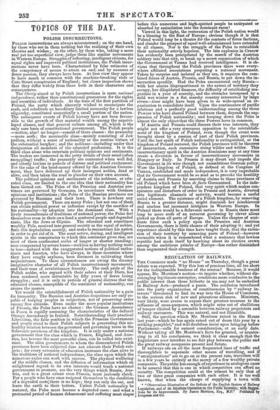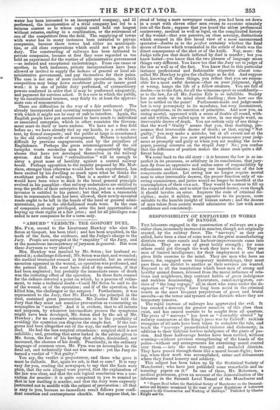REGULATION OF RAILWAYS.
THE Commons made "no House" on Thursday, though a great debate was expected. Why this loss of precious time, all too short for the indispensable business of the session? Because, it would appear, Mr. Morrison's motion—to inquire whether, without dis- couraging legitimate enterprise, conditions more conducive to the public interest than those hitherto in use may not be embodied in Railway Acts—produced a panic. The confusion introduced into the party organization of constituencies by "railway in- terests" threatened to find its way into the House of Commons, to the serious risk of new and precarious alliances. Ministers, very likely, were averse to expose their greatest measure to the influence of cross-purposes, which might arise out of ebullitions of temper elicited by a scramble between railway- proprietors and, railway customers. This was natural, and not Mendable. Still, the question which Mr. Morrison raised in the House last year—which he has again raised out of doors this year by a striking pamphlet,* and will doubtless insist upon bringing before Parliament—calls for earnest consideration, at an early date. Without taking all Mr. Morrison's facts for granted, or acquies- cing in all his conclusions, we think it clear enough that the Legislature must interfere to see fair play between the public and the great railway companies present and future. If railways are on all the most frequented lines of traffic and thoroughfare to supersede other means of travelling, and if "amalgamations" are to go on at the present rate, travellers will in a few years be entirely at the mercy of a few wealthy private• companies. Thepublic has enough of experience in analogous cases to be assured that this is one in which competition can afford no security. The competition could at the utmost be only that of two or three great companies with each other. It is too well known, that when the charge of supplying a town with * "Observations Illustrative of the Defects of the English System of Railway Legislation, and of its Injurious Operation on the Public Interests; with Sugges- tions for its Improvement. By James Morrison, Esq., M.P." Published by Longman and Co. water has been intrusted to an incorporated company, and ill performed, the incorporation of a rival company has led to a ruinous contest as to whose capital could hold out longest without returns, ending in a combination, or the retirement of one of the competitors from the field. The supplying of towns with water has in many instances been intrusted to private companies, because those towns had either no municipali- ties, or old close corporations which could not be got to do duty. The constructing of railways has been intrusted to private companies, because at first they were regarded as too bold an experiment for the routine of administrative government —as isolated and exceptional undertakings. From one cause or another, in both instances, private incorporations have been allowed or invited to supply the &cheese of general or local ad- ministrative government, and pay themselves for their pains. The case is not one of mere mercantile speculation, in which competition may bring down exorbitant profits or insure good work : it is one of public duty performed, of extraordinary powers conferred in order that it may be performed adequately, and payment for services asked. It is a case in which the public, by its constitutional trustees, may fairly fix at least the approxi- mate rate of remuneration.
There are difficulties in the way of a fair settlement. The already incorporated and operating companies have legal rights, with which it might not be easy or safe to interfere. Again, the English people have got accustomed to leave much to individual or associated enterprise, which in other countries the Govern- ment must do itself or leave undone. We have not a free field before us ; we have already tied up our hands, to a certain ex- tent, by formal compacts ; and the public at large is accustomed to the old slovenly mode of management. Reform is rendered difficult by previous engagements, and by the prejudices of Englishmen. Perhaps the gross mismanagement of the old turnpike trusts reconciles men to the comparatively trifling abuses that have yet developed themselves in the railway system. And the word •" centralization" will be enough to array a great mass of hostility against a central railway board. Perhaps opposition to the inquiry proposed by Mr. Mor- rison, stronger than otherwise would have been experienced, has been excited by his dwelling so much upon what he thinks the exorbitant profits of railways. That is a matter of detail : it would have been wiser to stick to the broad general principle evolved in his pamphlet—that railway undertakers are entitled to reap the profits of their enterprise for a term, just as a mechanical inventor is entitled to his patent; but that when a reasonable time to remunerate them has been allowed, their newly-invented roads ought to be left in the hands of the local or general admi- nistrations, just as the old-fashioned roads were. In the case of companies already privileged, seize the best opportunities of buying up their rights at a fair price ; and let all privileges con- ceded to new companies be for a term only.



























 Previous page
Previous page